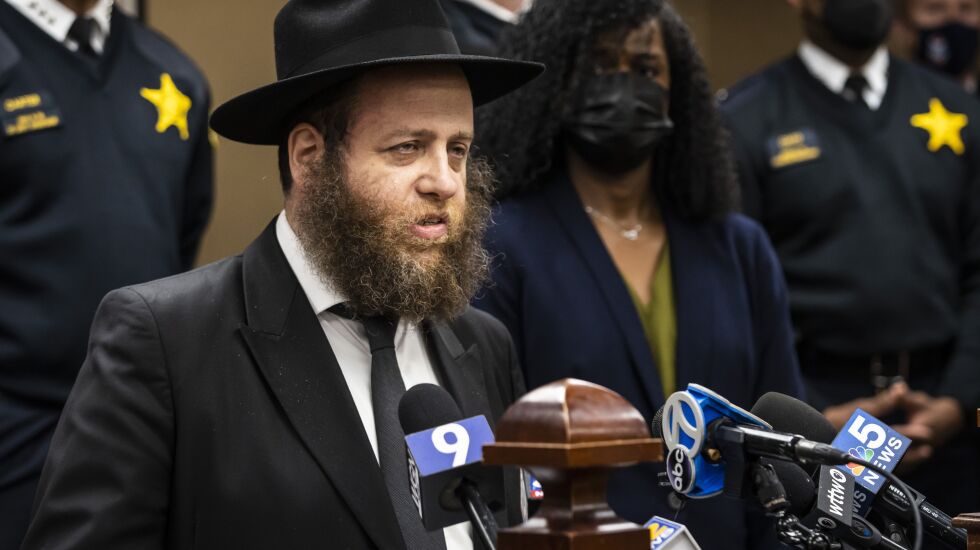
In January, a young man walked in front of a Jewish school on Chicago’s Far North Side and made a Nazi salute. The school recorded the hate-driven incident on a security camera but, as no crime was committed, administrators were unsure if a police response was appropriate.
Several months later — at the same school — another young man yelled “Heil Hitler” at a Jewish teen, but this time, according to police reports, he also threw a rock. The police were called and responded right away.
While a law enforcement response to a hate crime can be rapid and compassionate, many crimes — and incidents — go unreported. One reason is a misunderstanding of what merits a call to 911. Another reason is that there’s no universal reporting mechanism for hate incidents, such as threatening gestures, homophobic slurs yelled from a passing car, or the distribution of hate material on doorsteps. Presently, the City of Chicago fails to capture most data connected to what experts call “non-criminal hate incidents,” the hateful activities that can serve as precursors to violent crimes.
At this moment, we’re faced with a tough challenge: Statistics show hate crimes in Chicago are at a nearly 30-year high. Between 2021 and 2022, hate crimes increased in the city by more than 85%, according to a new report by the Center for the Study of Hate and Extremism.
It is time for Chicagoans to say enough and commit to reversing these trends. We have the support of all 50 alderpersons, the backing of a wide range of advocacy organizations throughout our city and the plan to do it.
The “Chi vs. Hate” ordinance — which was introduced earlier this month in the City Council — will make Chicago one of the only cities in the country to report and track non-criminal hate incidents. Using 311, residents will even be able to report these types of incidents, as well as hateful graffiti, via cellphones. Chicago will join Los Angeles and London as one of only a few cities in the world with the tools to crowd-source the fight against hate.
These innovations are overdue: Our municipal hate crime statute was last updated in 1990.
A shift in the way hate spreads
What’s happened since then? During an 18-month period in 1995 and 1997, more than 30 Black churches in the South were burned, prompting new federal laws.
In 1999, a white supremacist named Benjamin Nathaniel Smith targeted Orthodox Jews in Chicago’s 50th Ward and started a shooting rampage against racial and ethnic minorities across Illinois and Indiana, leaving two victims dead in two states.
Last month, a gunman killed three Black people in a racially motivated attack at a Dollar General in Jacksonville, Florida.
This is a tiny sampling of the tragedies that have happened across our nation. In our lifetimes, we have also witnessed a fundamental shift in the way hate spreads. Conspiracy theories and racist notions that were once whispered at private meetings or shared via leaflets have spread via social media into the mainstream. Small groups of hateful individuals have been allowed to promulgate their twisted worldview like never before in human history. Frighteningly, celebrities and elected leaders have elevated hate speech as well.
Here in Chicago, in just the last year, we have seen threats to businesses, libraries and schools, vandalism and harassment of homeowners displaying Pride flags, a knife attack on a trans person at a downtown skatepark, and more hateful actions.
The “Chi vs. Hate” ordinance leverages existing technology like 311 and will maximize municipal resources to be more responsive to communities and individuals affected by hate. New mandated reporting will give elected officials and the public the data we need to measure our successes and the challenges ahead.
With support from coalition members both local and national, Chicago is breaking new ground in the battle against hate. We thank you and welcome more partners to make Chicago a city that supports all our communities and takes a strong stance against hate in all its forms.
Ald. Debra Silverstein represents the 50th Ward on the City Council.
The Sun-Times welcomes letters to the editor and op-eds. See our guidelines.
The views and opinions expressed by contributors are their own and do not necessarily reflect those of the Chicago Sun-Times or any of its affiliates.







